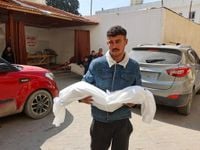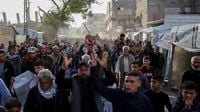In a dramatic sequence of events, Israeli authorities released Hamdan Ballal, a Palestinian director of the Oscar-winning documentary “No Other Land,” on March 25, 2025, just a day after he was allegedly assaulted by Jewish settlers and detained by Israeli forces in the occupied West Bank. Ballal, along with two other Palestinians, faced accusations of throwing stones at a settler, which they categorically deny.
The incident occurred in the village of Susiya, where Ballal was reportedly attacked by settlers who approached his home. In an interview with The Associated Press, he recounted the harrowing experience: “I told myself if they will attack me, if they kill me, I will protect my family.” He described how a settler struck him in the head, knocking him to the ground, and continued to kick him as soldiers looked on. Witnesses captured the scene, showing Ballal bloodied and blindfolded as he was taken away by military personnel.
Ballal spent the night in a military detention facility, where he suffered from injuries sustained during the assault. His lawyer, Lea Tsemel, confirmed that he and the other detainees were held on the floor of a military base. “They were kept handcuffed and blindfolded,” she stated, adding that they had been subjected to beatings while in custody.
The Israeli military claimed that the detention was justified, asserting that it had detained three Palestinians suspected of throwing rocks at forces during a violent confrontation. However, this narrative has been disputed by witnesses who allege that the settlers initiated the violence.
As tensions continue to escalate in the region, Israeli airstrikes have resulted in significant casualties. Reports indicate that at least 23 Palestinians were killed in Gaza overnight into March 25, including three children and their parents, who died in a tent. The Health Ministry in Gaza reported that hospitals have been overwhelmed, with at least 792 dead and 1,663 wounded since Israel resumed bombardments following the breakdown of a ceasefire with Hamas.
On March 25, the United Nations reported that Israeli authorities ordered another 100,000 to 120,000 people to evacuate northern Gaza, affecting two hospitals and a primary health care center. This evacuation order comes amid ongoing military operations that have displaced a staggering 142,000 Palestinians since Israel resumed its war on Gaza on March 18.
In a related humanitarian effort, Japan has stepped in to provide medical treatment for two Palestinian women injured in the conflict. Japan’s Defense Minister Gen Nakatani announced that one patient had already arrived in Tokyo, with another expected shortly. This initiative follows a request from the World Health Organization, highlighting the dire humanitarian conditions in Gaza.
Meanwhile, political developments in Israel have also been significant. The Israeli parliament passed a crucial state budget on March 25, a move that bolsters Prime Minister Benjamin Netanyahu’s governing coalition. This budget is seen as vital for Netanyahu, who faces mounting public pressure over the ongoing war in Gaza and his government’s controversial decisions regarding legal and security leadership.
As protests erupt within Gaza, thousands of Palestinians demonstrated against Hamas on March 25, marking what appeared to be the largest protest against the militant group since its attacks on Israel began on October 7, 2023. In Beit Lahia, demonstrators chanted slogans demanding an end to Hamas rule and called for the release of Israeli hostages.
In Washington, Mike Huckabee, President Donald Trump’s nominee for ambassador to Israel, faced tough questions during his Senate confirmation hearing regarding the potential annexation of the West Bank. Huckabee, known for his evangelical Christian support of Israel, avoided direct answers, prompting protests from pro-Palestinian demonstrators who interrupted the proceedings.
As the conflict continues, the situation remains dire. The Israeli military reported that two rockets were launched from Gaza into Israeli territory on March 26, escalating tensions further. IDF Chief Lt.-Gen. Eyal Zamir emphasized the need for a strong defense against threats, while the humanitarian crisis in Gaza deepens.
In Syria, Israeli strikes reportedly killed at least four people as clashes erupted with local residents. The Israeli military stated that the strikes were a response to attacks on its troops, reflecting the broader regional instability that accompanies the ongoing conflict.
As Israel grapples with the implications of its military actions and the humanitarian fallout, the international community watches closely. The situation remains fluid, with calls for ceasefires and diplomatic interventions growing louder as casualties mount and humanitarian needs escalate.
Netanyahu has warned that if Hamas does not release the remaining hostages, Israel may seize more territory in Gaza. “The more Hamas continues in its refusal to release our hostages, the more powerful the repression we exert will be,” he stated, indicating a potentially more aggressive stance moving forward.
The violence and political maneuvering in the region underscore the complexity of the Israeli-Palestinian conflict, with humanitarian concerns increasingly taking center stage as civilians bear the brunt of the ongoing hostilities.





